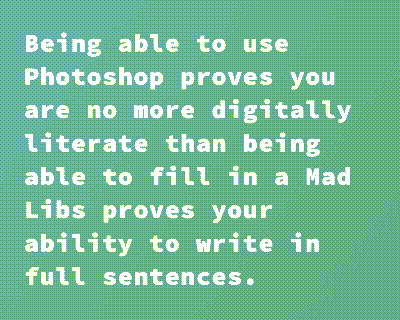What is Digital Literacy?
Jan 5, 2020

I have heard a lot of talk in art departments and on campuses in general about teaching "digital skills" or "digital literacy", whether it is necessary, what it entails, how to standardize it, and etc.. In most of these conversations, I have noticed that the assumed meaning of these phrases is based on facility with certain programs and the ability to complete certain tasks. While these things are important, I don't think that they really get to the heart of the issue of digital literacy.
To be literate in something is "having knowledge or competence" with it, so what does it mean to have competence with the digital and how does it intersect with arts education?
These are big questions for which I don't pretend to have full answers, but I do have an inclination of what digital literacy is not. Knowing a program such as Microsoft Word or Adobe Illustrator does not make one digitally literate, nor does being able to use social media networks, email services, or other web-based applications. And why? Because these are merely tasks you use a computer for, experiences designed and coded by others to make a given task (writing a paper, editing a photo, or etc.) easier. Being able to use Photoshop proves you are no more digitally literate than being able to fill in a Mad Libs proves your ability to write in full sentences.
As computers have advanced and user interfaces have improved, users have needed to know less and less about the machine they are using. In many ways this is great, especially in terms of accessibility, but it poses a problem for students who find themselves experts in certain programs while simultaneously being unable to properly store and backup their work much less interact with all the computer has to offer. For some professions this might not be much of an issue as most companies and other organizations will have IT departments, but this isn't always the case and simply avoiding tech problems isn't the only reason to strive for digital literacy. In an increasingly digital world, being able to think critically about the systems we are becoming ever more reliant on will be an essential skill for which any institution committed to the ideal of providing a liberal education should strive.
Further, artists in particular often find themselves acting as their own IT support: documenting their own work, updating their own websites, and more. For artists who hope to engage with digital media in their work either in terms of material or content, these issues and the issues of digital literacy are even more important. So what is digital literacy then? I think, in part at least, it means the following:
- - Familiarity with how a computer works in a basic sense: what is a CPU, what is RAM, what is an operating system, etc..
- - Familiarity with electrical circuits: how is an electrical circuit made, what does ground mean, and etc..
- - An understanding of what a computer can do: types of consumer programs, industrial applications, and etc..
- - A knowledge of how the internet operates from html/css and webpages, to servers and infrastructure.
- - Digital hygiene: keeping a system organized, being mindful of information security, and etc..
- - Digital skills: completing general professional tasks including email, spreadsheets, word processing, etc..
This list feels like a lot and parts of it might feel rather unnecessary, but I truly think that if one is to teach students how to be critical thinkers in the coming decades, knowledge of the above will be essential. Especially when one considers how these issues intersect with the issues such as politics, climate change, race, gender, migration, and more.
So, to start addressing these issues, I have decided to administer a digital literacy assessment to all of my students this semester with the goal of getting a sense of where they are in their knowledge of some of the above. The quiz consists of a self assessment section followed by a symbol identification section, a digital tasks section, and finally a "big questions" section. All of the sections preceding the "big questions" section follow along the same lines as many other digital literacy tests but the last section starts to get at the larger ideas addressed above. Some of the questions in this section include:
- - How does a computer function?
- - What is an operating system?
- - What is the difference between hardware and software?
These questions and this assessment in general in no way covers everything mentioned earlier in this piece but I think it is a good first step in assessing the students in order to better orient the class towards gaining greater digital literacy while addressing the studio tasks of the course.
Below is a link to the assessment, please feel free to use/copy it as you please. Note that the programs listed in the self assessment section were chosen for their relevance to my courses and are not an endorsement of them.
https://docs.google.com/forms/d/1YI9qtHQKnFmHRZiE9WnFy1kzTpB6A1tkgo6Q59MaO5E/edit?usp=sharing
For more information or to share your thoughts about this piece, please feel free to contact me at:
[email protected]